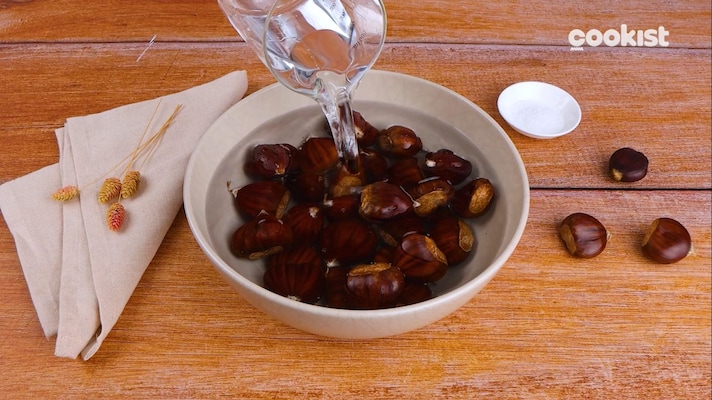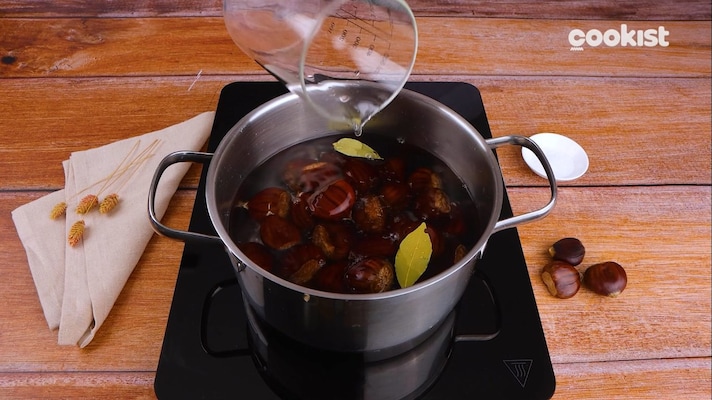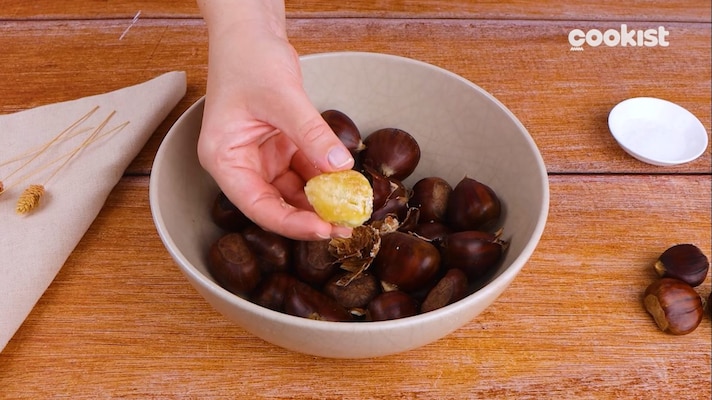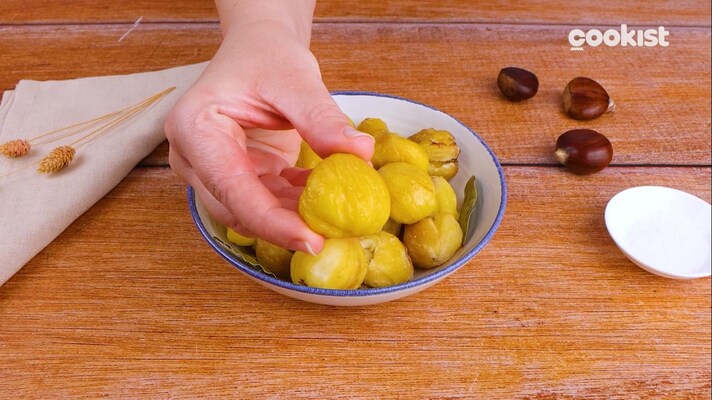
How to Make Boiled Chestnuts (Easy Recipe)

Chestnuts are a staple over the holidays, but they require cooking to make them more palatable. For change to traditional roasted chestnuts, consider trying these Boiled Chestnuts, which are infused with the flavors of bay leaves and salt. While you could eat these chestnuts as a snack or side dish, they are also great to add into vegetable dishes, soups, or salads.
To make these boiled chestnuts, you begin by soaking the chestnuts for 30 minutes before boiling them with bay leaves and coarse salt. The salad dissolves into the water, seasoning the chestnuts beautifully. Once the chestnuts are cooked, they are then drained and peeled before serving.
What are Boiled Chestnuts?
The boiling process softens the skin, making them easy to peel.
These chestnuts are wonderful over the holidays just as they are. However, they can also be added to stir frys, pureed soup recipes, or added into stuffing for turkey.
Pro Tips
- When choosing chestnuts, ensure that they feel heavy for their size and don’t have any blemishes, and aren’t dull in appearance.
- Don’t skip the step of pre-soaking the chestnuts as this will ensure the shells soften and make them easier to peel.
- If you don’t have coarse salt on hand, feel free to substitute with any other salt that you have.
- To peel the chestnuts, use a sharp knife, like a paring knife, to cut a slit into the skins of the chestnuts.
What to Serve with Boiled Chestnuts?
Boiled chestnuts can be served on their own alongside other dishes as part of a main meal. However, you will most often find them added into other dishes, such as sauteed mushrooms, braised onions with bacon, wild rice pilaf, mushroom parsnip soup, and more. If you plan on cooking dishes that include chestnuts over the holidays, this boiled chestnuts recipe will be the perfect way to prepare them before adding them to your chosen dishes.
What are Chestnuts?
Chestnuts are a type of nut but they are quite different from other nuts as they are more starchy and more rich in carbohydrates rather than fats. They also have a sweeter taste and a softer texture once they are cooked. They primarily grow in northern temperate countries but have become a Christmas staple.
How Should I Buy Chestnuts?
Chestnuts tend to be easiest to find in the grocery store during the holiday season. When shopping chestnuts, look for ones that have a bright brown appearance rather than being dull in color. You should also check that they don’t have wrinkled skin and that they seem heavy for their size as this will ensure that the chestnuts are fresh and aren’t dried out.
Can You Eat Raw Chestnuts?
Yes, raw chestnuts are safe to eat raw. However, they are most commonly roasted or boiled as it makes them easier to peel and eat. In their raw state, they aren’t particularly palatable, but cooking them brings out their sweetness.
How Can I Peel Chestnuts?
It’s easier to peel chestnuts when they are warm. So start peeling them one-by-one while they’re still in the warm water. You can also peel them by cutting the chestnuts in half and then squeezing the nuts out.
How to Store Boiled Chestnuts
The boiled chestnuts will keep in the fridge for up to 4 days if stored in an airtight container or sealable bag. However, you could also place them in a sealed bag in the freezer where they will keep for up to 3 months. The frozen chestnuts will only need a quick thaw before you use them in your chosen recipe.
Ingredients
How to Make Boiled Chestnuts

Step 1: Soak the chestnuts for 30 minutes. Then, rinse them under running water and allow them to drain.

Step 2: Transfer the chestnuts to a pot with the bay leaves, salt, and water; boil them for 45 minutes or until softened.

Step 3: Drain the chestnuts and peel them.

Step 4: Serve the chestnuts in a bowl.
;Resize,width=767;)



